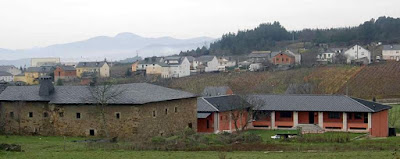A batch of worthwhile-mentioning bottles, and the story behind them naturally, came my way recently from this, what appears to be go-getting Spanish wine group. It features three wineries stationed across northern Spain: Bodegas Terras Gauda from Rías Baixas in Galicia (the far northwestern corner bordering northern Portugal), Bodegas
Pittacum in the Bierzo region (next door to the latter heading eastwards, the most north-westerly part of Castilla y León province) and Quinta Sardonia in better-known Ribera del Duero (still in Castilla y León, heading east and a little south towards the centre of Spain). Here's a hopefully enlightening smidgen of blurb on each place plus my notes/reviews of half-a-dozen of their generally tasty wines, even if occasionally a little overambitious on the oak front for the reds: more info @ terrasgauda.com.
Bodegas
Terras Gauda
Established at the end of the groovy 80s, this fairly sizeable winery, in the heart of Spanish white wine country, is encompassed by 160
hectares (an expansive 400 acres) of rolling green vineyards lying in the Val do Rosal "close to the mouth of
the River Miño." The guys here have apparently been doing some serious research on clones of this region's star grape variety, Albariño (also found just over the border in Portugal as Alvarinho), and indigenous yeasts (yawn, yes, but it's useful if you're trying to make good quality wine). As well as flaunting a claim to fame for resurrecting an almost lost local white variety called Caíño, which I'm informed is present in two of the wines featured below although isn't mentioned on the labels. US retail price is approx $24; they're also targeting the UK, so I'll update this with details of where and how much when I know more.
2010
La Mar Rías Baixas (Albariño & Loureiro, 12.5% alc) - much deeper golden/white colour compared to the 2011s with exotic
apricot and honeysuckle aromas/flavours, rounded and quite fat/oily texture vs lightly ‘chalky’ and citrus tones to finish;
shades of a 'Viognier/Riesling' mix! Drinking nicely now.
2011
Abadia de San Campo Rías Baixas (Albariño, 12.5%) - lovely
‘Sauvignon blanc/Riesling’ style-cross showing attractive
citrus gooseberry and blackcurrant leaf / celery notes, intense gummy
yeast-lees edges then nice crisp vs oily finish. Good.
2011 O Rosal Rías Baixas (Albariño, 12.5%) - similar zesty citrus and
aromatic ‘gummy’ profile vs more exotic peachy tones, more intense and
concentrated too with nice oily vs crisp mouth-feel; enticing ripe apricot-tinged fruit vs zesty bite, plenty of lingering flavours and good
‘chalky/mineral’ length. Hints of 'Australian Riesling' with more natural crispness and intensity, delicious dry white wine.
Bodegas Pittacum
 One of the pioneers of the possibly up-and-coming, and certainly very beautiful Bierzo region (I went on a trip here a couple of years ago: click here to read that feature), Pittacum is a relatively small 8-ha estate (20 acres), although cellar and vineyards are currently being expanded and upgraded. They have lots of old Mencía vines planted here, an intriguingly successful local red variety, "aged between 50 and 80 years
old" according to their blurb; as well as Garnacha (Grenache) which is the base of a newly launched label called La
Prohibición.
One of the pioneers of the possibly up-and-coming, and certainly very beautiful Bierzo region (I went on a trip here a couple of years ago: click here to read that feature), Pittacum is a relatively small 8-ha estate (20 acres), although cellar and vineyards are currently being expanded and upgraded. They have lots of old Mencía vines planted here, an intriguingly successful local red variety, "aged between 50 and 80 years
old" according to their blurb; as well as Garnacha (Grenache) which is the base of a newly launched label called La
Prohibición.
2007 Pittacum Bierzo (Mencía, 8 months in French and American oak, 14.5% alc) - toasty smoky and dark chocolate aromas layered with rich ripe black cherry fruit, dark choc texture and flavours run onto the palate with lush rounded mouth-feel; dry vs 'sweet' tannin/fruit/oak profile, powerful too with attractive developing savoury/earthy notes. Quite oaky but it does have substance and silky texture vs roasted coffee and bitter choc tones/twist. Drinking well now although should last a few years, becoming more savoury and liquorice-tinged after a day or two open vs ripe concentrated peppery fruit. Approx $24.
2007 Pittacum Aurea Bierzo (Mencía, aged 14 months in oak, 14.5% alc) - sourced from a 100+ year-old vineyard called Finca Areixola. Shows a fair coating of coconut/chocolate oak at first, moving on to a thick-textured rich wine with attractive smooth vs dry tannins; those touches of oak grain and coco/choc flavours did melt into the wine after it was open for a day, revealing more blue and black fruits, spices and a tad of fresh bite even too. Tasty with lamb meatballs actually.
Quinta Sardonia
Found in the blink-and-miss-it village of Sardón
del
Duero, about half-an-hour east of Valladolid, this 20 ha/45 acre estate lies "close to the
banks
of the
River
Duero (= Douro) at an altitude of 2500 to 2750 feet (750-850 metres)," which must have a moderating effect on otherwise sunny temperatures (although it's cold here in winter). They claim to have identified 11
different parcels and apply biodynamic techniques "to
achieve
balance
between
soil,
climate,
variety and
natural
environment." French
winemaker
Jerome
Bougnaud
and local resident Dane Peter
Sisseck (of Pingus fame) are called upon as consultants.
2007 QS (52% Tinto Fino = Tempranillo, 26% Cabernet Sauvignon plus Merlot, Syrah, Petit Verdot, Cabernet Franc, Malbec, kitchen sink... 16 months in 50/50 new/old French oak) - punchy 15% alcohol vs lush rounded palate, layers of smoky dark chocolate oak merge with darker fruit, maturing meaty edges and earthy/peppery tones; big mouthful of wine coated with bitter choc tannins giving grippy vs rounded mouth-feel, long powerful finish suffused with lush fruit, oak and enticing savoury flavours too. Wow, quite demanding and would suit red meat or game best.



